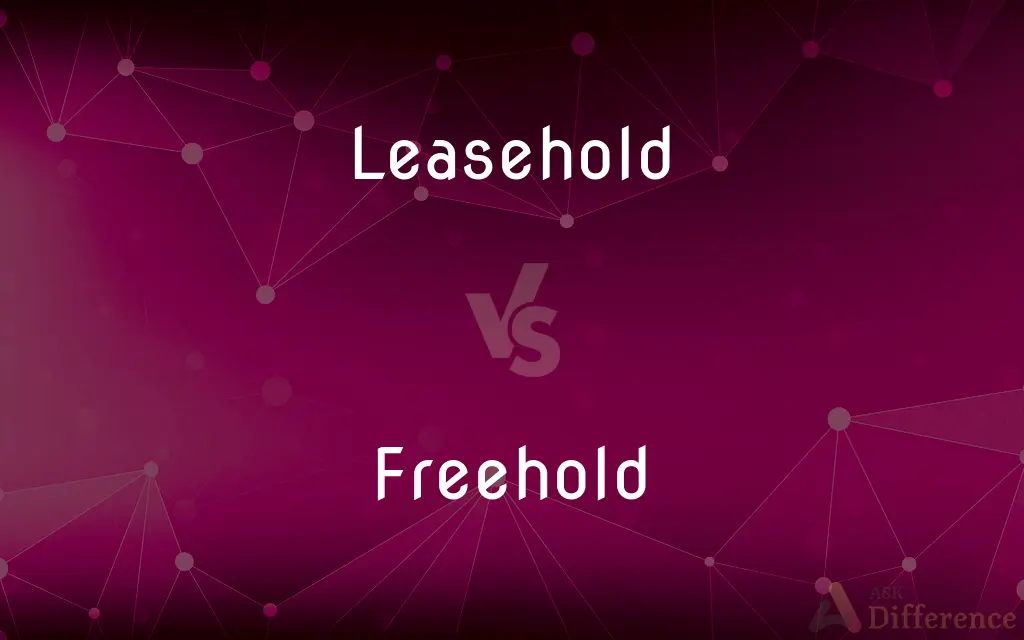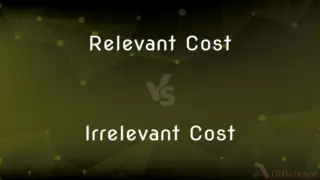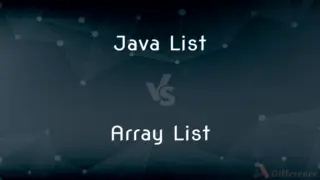Leasehold vs. Freehold — What's the Difference?
By Tayyaba Rehman — Published on January 15, 2024
Leasehold is a property interest for a fixed term, with the ownership returning to the freeholder upon term expiry. Freehold means outright ownership of the property and land indefinitely.

Difference Between Leasehold and Freehold
Table of Contents
ADVERTISEMENT
Key Differences
Leasehold refers to owning a property for a fixed period as set out in a lease agreement with the freeholder. The leaseholder has the right to use the property but doesn’t own the land it sits on. Freehold, in contrast, means owning the property and the land it's on indefinitely, with no time limit on the length of ownership.
Leasehold properties often involve paying ground rent to the freeholder and may come with various conditions, such as restrictions on alterations. Freehold ownership provides more control, as the owner is not answerable to a landlord and doesn't have to pay ground rent.
In a Leasehold arrangement, the maintenance and insurance of the building are usually the landlord's responsibility, though costs can be passed on to leaseholders. In Freehold, the owner is responsible for all maintenance, repairs, and insurance of the property.
The value of a Leasehold property can decrease as the lease term shortens, and extending the lease can be costly. Freehold properties tend to retain or increase in value over time and provide more stability in ownership.
Leasehold is common in apartment buildings where multiple people occupy the same land. Freehold is typical for standalone houses where one individual or entity owns both the structure and the land.
ADVERTISEMENT
Comparison Chart
Ownership Duration
Fixed term, specified in lease
Indefinite, with no time restrictions
Land Ownership
Does not include land ownership
Includes land ownership
Control and Costs
Less control, may involve ground rent
More control, no ground rent
Maintenance Responsibility
Often landlord's responsibility, costs can be passed to tenant
Sole responsibility of the owner
Common Property Types
Apartments, flats
Standalone houses, individual plots
Compare with Definitions
Leasehold
Ownership of property for a fixed term.
I have a leasehold interest in my apartment for 99 years.
Freehold
Complete ownership of property and land.
Owning a freehold means I have full control over my house and land.
Leasehold
Common in multi-occupancy buildings.
Most flats in this area are sold on a leasehold basis.
Freehold
No time limit on the length of ownership.
As a freehold owner, I can pass down my property to my heirs.
Leasehold
May have restrictions on property use or alterations.
Under my leasehold agreement, I need permission to make major renovations.
Freehold
No ground rent or service charges.
One advantage of freehold is not having to pay any ground rent.
Leasehold
Involves ground rent and service charges.
As a leaseholder, I pay annual ground rent to the freeholder.
Freehold
Responsible for all maintenance and repairs.
As a freeholder, I'm responsible for the upkeep of my property.
Leasehold
Lease can be extended, usually at a cost.
I extended the leasehold on my property to maintain its value.
Freehold
Often relates to standalone properties.
Freehold is the most common form of ownership for houses.
Leasehold
The fact or condition of holding property by lease.
Freehold
A form of estate in which possession is held in fee, in tail, for the duration of the person's life, or during the life of some other person.
Leasehold
Property held by lease.
Freehold
The tenure by which such an estate is held.
Leasehold
(property law) Of an estate in land, held for a term of years absolute by a lessee or tenant.
Freehold
A tenure of an office or a dignity for life.
Leasehold
A leasehold estate in land.
Freehold
(property law) Of a tenure or estate in land, held in fee simple absolute in possession by a proprietor; granted out of the allodial title, liable to determine only on escheat.
Leasehold
(property law) Real property held as an estate in land of this type.
Freehold
Freehold tenure.
Leasehold
Held by lease.
Freehold
(property law) Real property held by a tenure of this type.
Leasehold
A tenure by lease; specifically, land held as personalty under a lease for years.
Freehold
To dispense property in this way.
Leasehold
Land or property held under a lease
Freehold
An estate in real property, of inheritance (in fee simple or fee tail) or for life; or the tenure by which such estate is held.
Freehold
An estate held in fee simple or for life
Freehold
Tenure by which land is held in fee simple or for life
Common Curiosities
What is Freehold ownership?
It means owning the property and the land it's on indefinitely.
Why do lease periods vary?
Lease terms are set by the freeholder and can vary based on the property and agreement.
How does Leasehold affect property value?
The value can decrease as the lease term shortens.
What is Leasehold ownership?
It's owning a property for a fixed term as per a lease agreement.
Who is responsible for repairs in Freehold properties?
The freeholder is solely responsible for all repairs and maintenance.
Who pays for building insurance in Leasehold?
Usually, the freeholder, but costs can be passed to leaseholders.
Are there any benefits to Leasehold?
It can be initially cheaper and is common in high-demand urban areas.
Can a Freehold be converted to Leasehold?
Not typically, as it involves giving up ownership rights.
Can a Leasehold become a Freehold?
Yes, through a process called enfranchisement where leaseholders buy the freehold.
Do Freehold properties have service charges?
No, freeholders do not pay service charges.
Is Leasehold common for houses?
It's less common for houses, more so for apartments and flats.
How does selling a Leasehold property work?
The lease and its terms are transferred to the new owner.
Can you extend a Leasehold?
Yes, but it often involves additional costs.
Why might someone choose Leasehold over Freehold?
For affordability or availability in certain city locations.
Does Freehold offer more freedom than Leasehold?
Yes, in terms of property use, alterations, and no ground rent.
Share Your Discovery

Previous Comparison
Relevant Cost vs. Irrelevant Cost
Next Comparison
Java List vs. Array ListAuthor Spotlight
Written by
Tayyaba RehmanTayyaba Rehman is a distinguished writer, currently serving as a primary contributor to askdifference.com. As a researcher in semantics and etymology, Tayyaba's passion for the complexity of languages and their distinctions has found a perfect home on the platform. Tayyaba delves into the intricacies of language, distinguishing between commonly confused words and phrases, thereby providing clarity for readers worldwide.












































